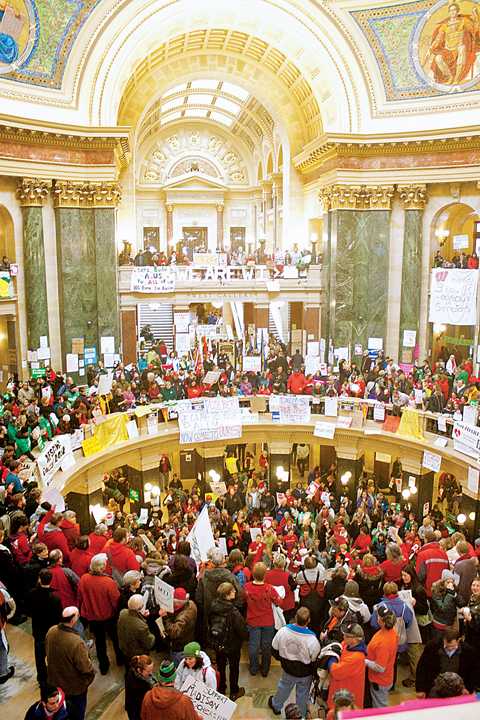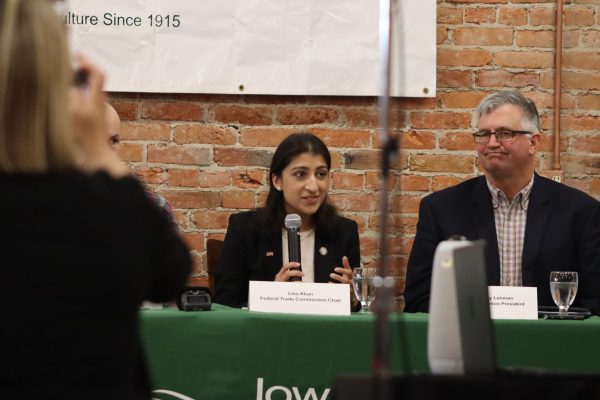Wisconsin protests gain national attention
Protesters gather in the rotunda of the Wisconsin Capitol on Monday in Madison, Wis., to demonstrate their opposition to Gov. Scott Walker’s proposed budget bill. Monday was the seventh day of protest in the Capitol.
February 21, 2011
MADISON, Wis. — Sore feelings retained their presence Monday in Wisconsin’s Capitol, as protesters gathered around and inside for the eighth day of protesting the state’s recently elected Gov. Scott Walker and Senate Bill 11, also known as the state’s “budget repair bill.”
Several aspects of the controversial bill triggered public outcry, especially its elimination of the collective bargaining rights of almost all public employees. In a news conference Monday, Walker, a Republican, stated that he has no intention of negotiating this aspect of the bill, despite the fact that targeted unions have agreed to pay more for their pensions and insurance.
“I’m here because I’m angry at Scott Walker for not even recognizing the fact that he’s not allowing the people of Wisconsin to negotiate,” said Marcia Connor, Dane County Juvenile Reception Center employee. “I don’t mind paying … the increased contribution to the retirement fund, I don’t mind the increase to the health insurance premiums, but it makes me very angry that he’s telling us that he won’t even talk to us about it. To take away our rights is very scary. To me, it’s like an autocracy, and I never imagined that something like that would come to Wisconsin; it scares me.”
Protests have drawn support throughout the state, nation and world.
Local restaurants have been flooded with orders to feed the protesters, along with making donations of their own, and Tom Morello, former guitarist for Rage Against the Machine and Audioslave, made an appearance to support the protesters and performed twice near the Capitol.
“When I was at the airport someone asked me, ‘Why are you going to Madison?'” Morello told the crowd at his first performance on the steps of the Capitol. “I said, ‘Because they’re making history in Madison, that’s why I’m going there!'”
Morello referenced his childhood growing up with a mother who was a public high school teacher for almost 30 years, and the fact that although his family “never had much money, [they] always had enough food on the table and clothes on [their] backs because [his] mom was a union high school teacher.”
Though it would impact all state employees, the proposed bill’s effects on teachers has received the most attention. The loss of teachers’ unions would allow the legislature to dictate various aspects of the job that teachers currently have a say in, including benefits, class sizes, how many hours a day is required to teach and when they start and end their days.
“It is my belief that the future of the rights of working people in this country will not be decided in Congress, it will not be decided in the courts, it will not be decided on talk radio, it will not be decided on Fox News, that the future of the rights of working people in this country will be decided on the streets of Madison, Wis.,” Morello said.
Members of the crowd had their own reasons to gather at the Capitol, but whether they were in attendance to defend their own rights or the rights of others, all were there in support of basic human rights.
“I’ve got aunts and uncles that are all teachers and untold amounts of family members that work for the state,” said Elliot Lebrun, a student at University of Wisconsin-Stevens Point. “I just don’t see why people don’t get that our state workers built this country, and they should be known for that.”
Groups that aren’t targeted by the bill also showed up to support their fellow state workers Monday, as representatives from the local fire department and United Steelworkers announced plans to sleep in the Capitol on Monday night.
Several other states across the nation, including Iowa, Ohio and Arizona are considering changes to their collective bargaining systems similar to those proposed in Wisconsin. Signs reading “Governor Walker: The whole world is watching” best describe the state of the national debate, which seems to be poised on the outcome of Wisconsin’s public demonstrations.

















